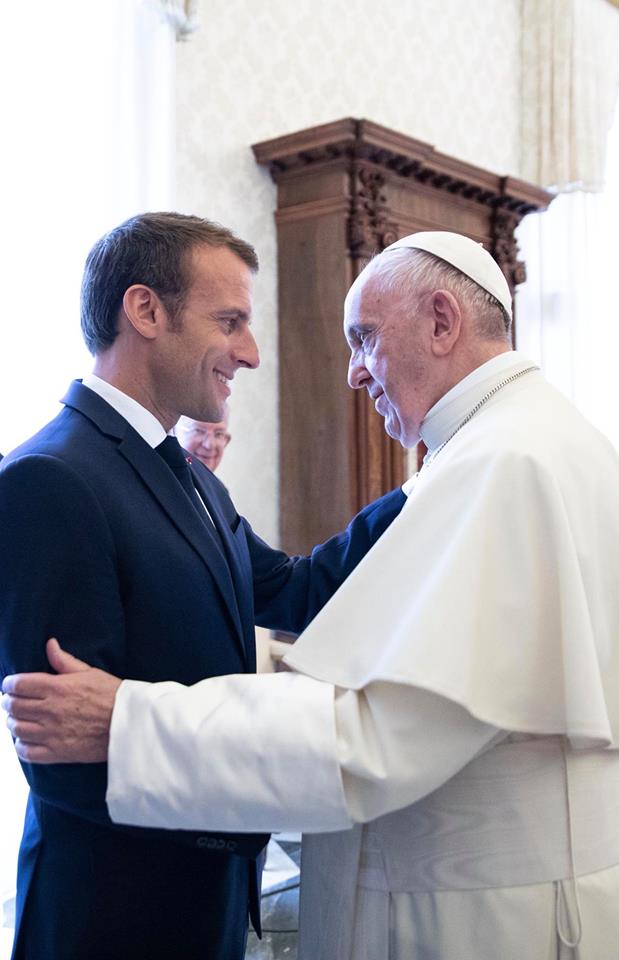
VATICAN CITY – Pope Francis and French President Emmanuel Macron held lengthy private talks at the Vatican Tuesday to discuss immigration and to reflect on Europe’s prospects amid growing challenges to the continent’s unity.
Tensions in the European Union over how to share the responsibilities of mass migration are testing the bloc’s staying power. Looming over a key EU meeting later this week are clashing views among members on how to handle the crisis caused by the arrival of hundreds of thousands of migrants fleeing conflicts and poverty in the Middle East, Africa and Asia.
Francis and Macron spoke for 57 minutes in the pope’s library in the Apostolic Palace. Originally, the pope’s schedule called for 45 minutes with the French leader.
After they emerged from their closed-door talks, Macron put a hand on Francis’ shoulder, and then kissed him on both cheeks. Francis reciprocated the warmth, gripping the French leader’s arm and then shaking his hands vigorously and smiling broadly as he said goodbye. He also took the hand of Macron’s wife, Brigitte.
The Vatican described the talks as “cordial,” saying they highlighted “the good existing bilateral relations.”
It said the two discussed global issues, including migration, the environment and conflict prevention and resolution, especially disarmament.
“The conversation also permitted an exchange of views on various situations of conflict, particularly in the Middle East and in Africa. Finally, there was a joint reflection on the prospects of the European project.”
For his part, Macron described his meeting with Francis as “extremely rich and intense.” He told the pope the “progressive” way to handle the migrant crisis was through “a true policy of development for Africa,” the president recounted at a news conference.
Last week, Francis urged nations to welcome all the refugees they could properly integrate into society. The pope said governments should also work to improve the lives of people in Africa rather than continue viewing the continent as ripe for exploitation.
Coming at a time of testy French-Italian relations, Macron’s visit was officially strictly Vatican-related, with no meetings scheduled with Italian government leaders. But Italy’s new premier, Giuseppe Conte, did meet in Paris with Macron earlier this month for talks that risked being scuttled after France scathingly criticized Italy for not allowing a private rescue boat with more than 600 migrants aboard to dock in Italian ports.
Italy’s new leaders had retorted that France sends back migrants who illegally enter France from Italy and shouldn’t be giving Rome any lectures.
Spain eventually gave the ship safe harbour.
Italy has allowed some 600,000 migrants, rescued at sea in the last few years from smugglers’ boats setting out from Libya, to step onto its soil. But the new right-wing interior minister, Matteo Salvini, says Italy can no longer be “the refugee camp” for Europe.
As is his custom with guests, Francis gave Macron a medal depicting St. Martin of Tours, who gave his cloak to a poor man.
The medal “aims at underlining the vocation of those who govern in helping the poor,” Francis told Macron. “We are all poor.”
He also gave Macron copies of his various writings, including his encyclical on the fragility of the Earth, and his last message marking the Church’s World Peace Day.
Macron, who was accompanied by his wife, Brigitte, presented Francis with a copy of “The Diary of a Country Priest” by Georges Bernanos. The book recounts the story of a young French priest who learns humility in tending to the faithful.
“I already read it. Many times.” said Francis. “It did me well to read it.”
Earlier, the president met with officials from the Rome-based Catholic charity, the Sant’Egidio Community. The group has organized humanitarian flights of Syrian refugees to Italy so that those fleeing war will have an alternative to risky journeys across the Mediterranean to reach safety in Europe and to life in crowded refugee camps in the Middle East.
Community president Marco Impagliazzo said they “spoke above all of a European solution to this migration crisis that is not only a crisis of the flow of migrants but also a problem of what to do with the people when they arrive in Europe, what will they do, how will they be inserted into society.”